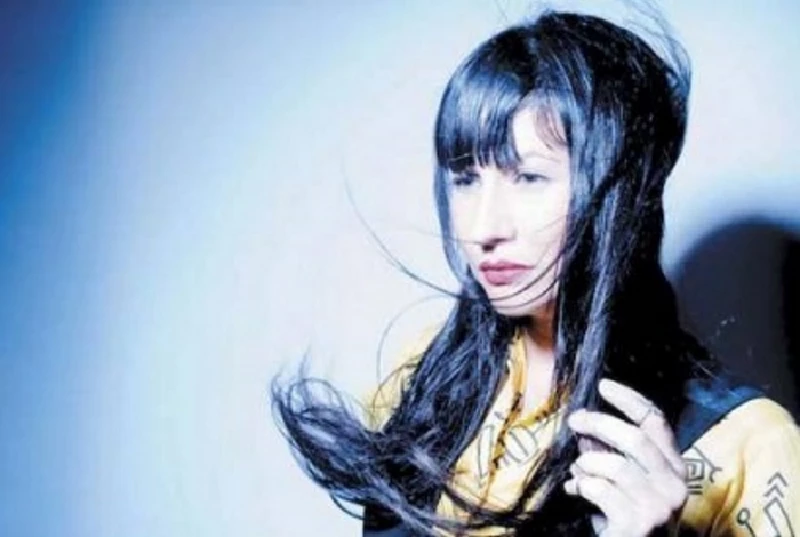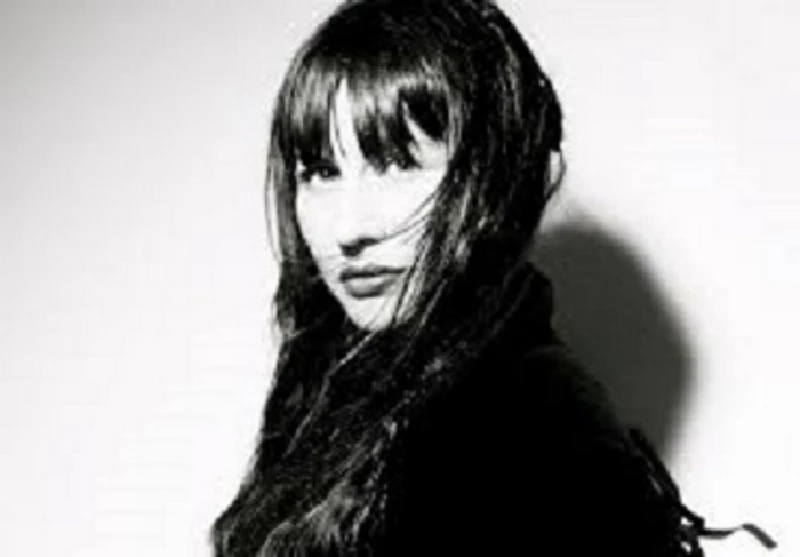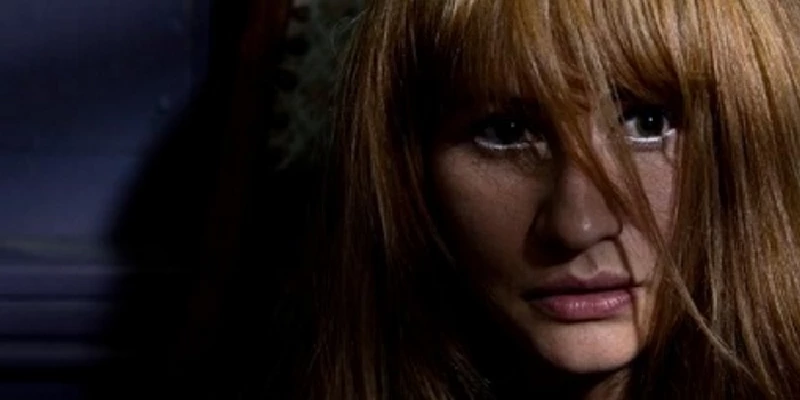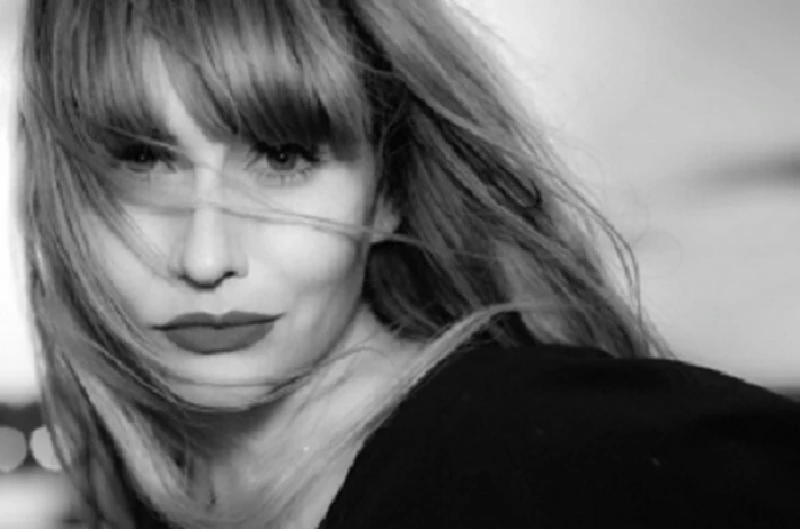Frankie Rose - Interview
by Jeff Thiessen
published: 14 / 11 / 2014

intro
Jeff Thiessen chats to former Dum Dum Girls member Frankie Rose about her two albums under her own name, 'Interstellar' and 'Herein Wild'
I’ll let you in on a little secret in music journalism that may, or may not surprise you: the part of this job that allows us to interview the musicians we listen to is...not all that great. I’m not being facetious or whatever. When I first started getting published writing about music six years ago, it was certainly one of the main things I was looking forward to. Took a while before I finally got to talk to someone I legitimately enjoyed as a musician (Alex Paterson of the Orb, who in fairness, was quite interesting and a delight to converse with). Having said that, the vast majority of my interviews provided nothing of interest. It was sort of a let down at first - “How come all these people who make vastly interesting and compelling music are such duds to talk to?” Then I figured it out. They might be duds, but they might not be - an interview is rarely a good way to figure this out, because most musicians don’t care about creating an engaging interview. They instead are using the interviewer to plug whatever upcoming or recent release they have to publicly stand behind. This isn’t to say I got nothing compelling out of our talks, but I got far better results once I understood the endgame goal and weaseled my way around the system designed to help me help them sell concert tickets. Still wasn’t a perfect solution, aspublicists have a way of sniffing out this tactic and squashing the Q & A with extreme prejudice. The struggle is real, but no good interview emerges with ignorance in this area. This time I’m flipping it around. I’m using Frankie Rose for an interview to get her music out there. It deserves to be. If I’m being honest, I’ll admit my almost singular goal here is to leave no doubt in the readers' mind that they absolutely must hear this woman’s music. I was a bit apprehensive about contacting her at first. Usually I get assigned interviews. Also Frankie doesn’t do a ton of press. But I figured it was worth a shot - go direct to the source, avoid publicists, and perhaps most importantly, contact her at a time when she has new music out, but doesn’t necessarily feel any pressure to focus exclusively on it. So, I did and turns out she was into the idea. I knew I had to start with the album that got me obsessed with her in the first place, 2010’s 'Interstellar'. It’s an odd album to worship when it comes to talking to her about it. So much of its appeal most likely comes at the expense of Frankie herself, as the music on the album seems to be wrestling beauty from a heap of ugliness and isolation. “I had been thinking that I wanted to work more with synths and drum samples around the end of my record cycle for the ‘Outs’ album. I knew I wanted to step away from distortion and do something more streamlined, so I took my time, wrote some songs, and found a dance producer to help me find exactly the sounds I wanted to use.” In truth, 'Interstellar' and to a large extent its follow-up 'Herein Wild' has some danceable qualities on the surface, but it’s not really hard to see the seething underbelly that permeates beneath the gloss. In fact it begins to dominate rather quickly. Both of these albums focus fairly intensely on half-forgotten memories that seem to exist on an astral plane of some kind. It seems like they are close. But fading into an existence we can feel, but can’t see or touch. This is the parallax of both her solo releases. “The songs are much more pop than 'Interstellar', but, however, lyrically it is one the darkest records I have ever made.” This is true, but the music still galvanizes us. It just comes from some pretty desolate places; empty streets, blackened depths, towering cliffs. All of this imagery is carefully created by Frankie, but the sad part isn’t necessarily the picture she paints. It’s why she paints it. There are no echoes in these places. Frankie wants to throw her voice into the world but doesn’t really want to hear what she’s saying. “I feel like every album I have made says a lot about where my head space was at the time I wrote it. I try to make an album an experience and I try my best to create a world through music in the form of an album...I hope that I have done this. If my albums transport people to another place, then I have done my job.” Frankie’s answers are succinct. They don’t reveal much, or indicate any agenda whatsoever. I asked her something about why we don’t see her doing press releases, or she has zero existence on Twitter. “I like to stay in the moment. I have many things that I like to do and most of them do not involve constantly being on my phone or taking a picture of something.”. When you read quotes like this, or listen to 'Interstellar' or 'Herein Wild', it’s important to contextualise. There’s a quiet power about Frankie. Not in the traditional sense but it lies with consistency. She never strays from course and we start to see a deliberate attempt at compounding all of her baggage into one collective heap, and then effortlessly releasing it all into one beautiful stockpile. Nowhere is this better articulated than the closing cuts off both albums. ‘The Fall’ shows us failure can be freedom. ‘Requiem’ is a well-earned apocalyptic surrender. 'Interstellar' was a complete breakthrough on every level, and in time will be recognized as the gorgeous piece of work it presents. 'Herein Wild' was the logical extension of that release, and doesn’t really deviate from the world Frankie created from scratch on her debut. The world is a definitely a spacious one, plenty of room for beauty, and even more room for wondering where things went wrong, or perhaps, if they’ll ever go right. I suppose the best way I could explain the music on these albums is a babylon. Easy to marvel at but layers of sadness are buried between the walls. You don’t really want to stay, but don’t know how you could ever leave. Frankie knows something very few songwriters know. It’s dumb to moralise anything. 'Interstellar' and 'Herein Wild' don’t wrestle with ill advised bouts of right and wrong, no inner struggle to speak of. Instead we’re faced with a singer who just wants to wake up and have her thoughts and decisions make sense on some, any level. Not too far into 'Interstellar', we seem to figure out a conclusion Frankie hasn’t quite gotten to (yet): for her, and most of us, confusion is the only thing that really makes any sense. If you think I’m out to lunch, Frankie cops to this during the interview: “My best moments are when I have realised how much love people have for my music. Even if it is not large amounts of people, knowing that they are there, makes up for all the bad times. The worst moments have had to do with being a broke musician, for example, cleaning peoples houses after a tour that made no money. And of course bad reviews, being harshly judged does not feel great. I am still waiting for that moment when I realize I fit in.” Her mistakes are not really intertwined with her inspirations. But it seems for all intents and purposes, they are largely the same. This interview was important to me. Probably wasn’t important to Frankie. The actual dialogue didn’t mean a great deal to me, but sometimes you just want to reach out to someone who has created something that has given you such an everlasting gift. Sometimes you just want to feel a pulse and make sure that gift was real. For any of you reading, the imagery I created here wasn’t the result of hyperbole or any expensive hallucinogen. Frankie released two albums that created an entire universe for me, from nothing. It’s a breathtaking, lush, resplendent place that allows you to stay just long enough before everything ends and her rapture gently ushers us back into our cold reality. If we accept the invitation to this world, we have to accept that Frankie’s surroundings hangs a tiny bit closer to languor than hope. Before 'Interstellar', I had sort of forgotten how much buying an album could mean to me. Even four years after its release, I still feel habitually compelled to listen to it over, and over. 'Herein Wild' allows me an extended presence in the same place...but of course can’t fully duplicate what I felt when I took my first step into 'Interstellar'. I admit that music doesn’t have quite the same effect on me it used to. Maybe that sounds like a sad statement but it’s a realistic consequence of listening to music every single day since I truly discovered it with Nine Inch Nail’s 'The Downward Spiral' at the ripe age of eleven in 1994. I didn’t start writing about rock music because I wanted to interview rock n’ rollers. I started writing about music because I didn’t really see any other way of expressing how much it meant to me. 'Interstellar' was a tropism for me, and 'Herein Wild' allowed it to sustain itself. I hope by now it’s clear that my motivation for this interview wasn’t for Frankie’s benefit, it was for yours. I got into this because I wanted a single person to read what I wrote so hopefully, and that they would listen to what I’m writing about. Since then I’ve continued to do it for a variety of reasons...de-hyping a band everyone else seems to senselessly love, advance promos of albums, corresponding with other obsessives, defending the value of unheralded acts/albums. I’m not necessarily embarrassed that my trek took on a mutated meaning I didn’t anticipate. But I am alert to the fact Frankie Rose yanked me away from that to remind me why I got involved in writing about music in the first place. I just wanted to hear the voice of someone who brought me back to the beginning, why writing about a group of songs was not only deeply satisfying, but ultimately pretty goddamn necessary for me to do. 'Interstellar'/'Herein Wild' didn’t change my life - I think that description gets tossed around too much - but it did invigorate it. Didn’t change where I was going, but made it a more worthwhile journey. The political climate of music, shifting nature of industry economics, semantic debates over who falls into what category...this is the cloak of music journalism I seem to be ensconced in. And that’s ok, I’ll live with that and enjoy being a part of it at times. But not today. Today I write about something more.
Picture Gallery:-




most viewed articles
current edition
Carl Ewens - David Bowie 1964 to 1982 On Track: Every Album, Every SongArmory Show - Interview with Richard Jobson
Colin Blunstone - Thalia Hall, Chicago, 16/7/2025
Bathers - Photoscapes 1
Visor Fest - Valencia, Spain, 26/9/2025...27/9/2025
Billie Eilish - O2 Arena, London, 10/7/2025
Robert Forster - Interview
Loft - Interview
John McKay - Interview
Editorial - July 2025
previous editions
Heavenly - P.U.N.K. Girl EPManic Street Preachers - (Gig of a Lifetime) Millennium Stadium, Cardiff, December 1999
Oasis - Oasis, Earl's Court, London, 1995
Beautiful South - Ten Songs That Made Me Love...
Trudie Myerscough-Harris - Interview
Pixies - Ten Songs That Made Me Love...
Simon Heavisides - Destiny Stopped Screaming: The Life and Times of Adrian Borland
Paul Clerehugh - Interview
Doris Brendel - Interview
Prolapse - Interview
most viewed reviews
current edition
Amy Macdonald - Is This What You've Been Waiting For?Sick Man of Europe - The Sick Man of Europe
Alice Cooper - The Revenge of Alice Cooper
Phew, Erika Kobayashi,, Dieter Moebius - Radium Girls
Davey Woodward - Mumbo in the Jumbo
Lucy Spraggan - Other Sides of the Moon
Blueboy - 2
Cynthia Erivo - I Forgive You
Philip Jeays - Victoria
Lapsley - I'm a Hurricane, I'm a Woman In Love
related articles |
|
Frankie Rose: Interview (2014 |

|
| Jeff Thiessen chats to former Dum Dum Girls member Frankie Rose about her two albums under her own name, 'Interstellar' and 'Herein Wild' |
Pennyblackmusic Regular Contributors
Adrian Janes
Amanda J. Window
Andrew Twambley
Anthony Dhanendran
Benjamin Howarth
Cila Warncke
Daniel Cressey
Darren Aston
Dastardly
Dave Goodwin
Denzil Watson
Dominic B. Simpson
Eoghan Lyng
Fiona Hutchings
Harry Sherriff
Helen Tipping
Jamie Rowland
John Clarkson
Julie Cruickshank
Kimberly Bright
Lisa Torem
Maarten Schiethart